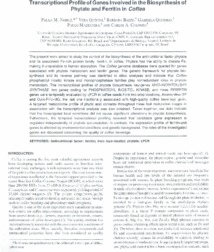Transcriptional profile of genes involved in the byosynthesis of phytate and ferritin in coffea.
Transcriptional profile of genes involved in the byosynthesis of phytate and ferritin in coffea.
Author(s): NOBILE, P. M.; QUECINI, V.; BAZZO, B.; QUITERIO, G.; MAZZAFERA, P.; COLOMBO, C. A.
Summary: The present work aimed to study the control of the biosynthesis of the antinutritional factor phytate and its associated Fe-rich protein family, ferritin, in coffee. Phytate has the ability to chelate Fe, making it unavailable to human absorption. The Coffea genome databases were queried for genes associated with phytate metabolism and ferritin genes. The genetic framework for phytate biosynthesis and its reverse pathway was identified in silico analyses and indicate that Coffea phosphatidyl inositol kinase and monophosphatase families play nonredundant roles in phytate metabolism. The transcriptional profiles of phytate biosynthesis key-genes MYO-INOSITOL(3)P1 SYNTHASE, two genes coding for PHOSPHATIDYL INOSITOL KINASE, and three FERRITIN genes were temporally evaluated by qPCR in coffee seeds from two crop locations, Adamantina-SP and Ouro-Fino-MG, the last one traditionally associated with high-quality coffee beverage grain. A targeted metabolome profile of phytic acid contents throughout three fruit maturation stages in association with the transcriptional analysis was also obtained. Taken together, our data indicate that the investigated local conditions did not cause significant alterations in phytate biosynthesis. Futhermore, the temporal transcriptional profiling revealed that candidate gene expression is regulated independently of phytate accumulation. In contrast, the expression profile of ferritin-unit genes is affected by environmental conditions and genetic background. The roles of the investigated genes are discussed concerning the quality of coffee beverage.
Publication year: 2010
Types of publication: Journal article
Unit: Embrapa Grape & Wine
Observation
Some of Embrapa's publications are published as ePub files. To read them, use or download one of the following free software options to your computer or mobile device. Android: Google Play Books; IOS: iBooks; Windows and Linux: Calibre.
Access other publications
Access the Agricultural Research Database (BDPA) to consult Embrapa's full library collection and records.
Visit Embrapa Bookstore to purchase books and other publications sold by Embrapa.

